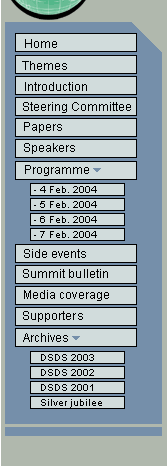

![]() Themes
Themes
The Water and Sanitation Challenge: How Complex? How Urgent?
Provision of good water and sanitation services is a pre-requisite to achieving several Millennium Development Goals, which were reaffirmed at the WSSD (World Summit on Sustainable Development). However, measures for promoting sustainable use of water are far from satisfactory, with about 1.2 billion people still lacking access to safe drinking water and 2.4 billion lacking adequate sanitation facilities. The ever-increasing competition for water affects the poor most, especially women and children who have to walk farther in search of water to meet minimal household needs. This session will review initiatives in the water and sanitation sector – Is enough being done to make the delivery and management of these services more participative? How should the regulatory, management and financial aspects of these services be strengthened? How can cross-sectoral management of water resources be improved?
Energy for Sustainable Development: Ensuring Economic Growth and
Universal AccessAbout 2 billion people in the world, mostly in the rural areas, do not have access to electricity, a further 2 billion are severely undersupplied. One-third of the world continues to rely on traditional fuels, with serious gender implications. At the same time, burgeoning energy demand increases the threat to the global environment. The key challenges facing the world relate to ensuring universal and equitable access to clean and efficient energy services, with a focus on decentralized systems. This session will review if enough is being done by way of policy, institutional, and technological initiatives to meet these challenges.
Food Security and Sustainable Livelihoods: Global Surpluses and Household Deficiencies
About 70% of poor people in developing countries live in rural areas and depend directly or indirectly on agriculture for livelihoods. These people and entire economies are now threatened by the impacts of unsustainable agricultural policies and practices on the natural resource base. This session will focus on initiatives needed for agricultural intensification and to make agriculture a vehicle of growth for poverty reduction. These include initiatives to address serious constraints on agriculture – limited natural resources, unfinished institutional reforms, poor rural infrastructure, and systems for knowledge generation and dissemination.
Public Education in a Knowledge Society: Creativity, Content, and Delivery Mechanisms
Many of the sustainability concerns that we face are rooted in attitudes, behaviours, and inadequate awareness and information. Educational institutions and the media have an enormous responsibility in creating an informed and sensitive society. This session will examine how sustainable development can be ‘taught’ in schools and universities and how the media can become an effective channel for sounding alarms and sharing lessons.
Defining the Stakes, Engaging the Stakeholders: Inclusive Approaches for Coordinated Action
There is an urgent need to identify and coordinate the roles and responsibilities of various stakeholders such that an efficient financial and institutional framework can be evolved for meeting developmental objectives. This session will discuss experiences and lessons in conceiving and delivering efficient public–private partnerships, along with the engagement of other stakeholders, to address critical environment and social issues as well as in using new instruments for promoting greater environmental accountability in the private sector.
Bridging the Science and Technology Gap: Institutional Innovations and Effective Financing
A major obstacle to sustainable development for much of the world is the lack of scientific and technical capacity. There is a felt absence of harnessing science and technology to address the fundamental questions of sustainable development. How should appropriate technologies be developed, transferred, and adapted and scientific capacity built and maintained through stronger partnerships between the scientific community on the one hand and policy-makers, business, and civil society on the other? How should the process of technology transfer amongst countries be strengthened? This session will assess if enough is being done to answer these questions.
Taking Stock: Have We Achieved Anything Since WSSD and Charting the Path Ahead: Creating Political Resolve and Forward Momentum
The challenges of sustainable development require cross-ministerial and multi-disciplinary solutions. This implies that while on the one hand, environment ministers have to step beyond the traditional mandate of their ministries, other ministers must also get involved to ensure an integrated framework that harnesses the coordinated efforts of all ministries and governments. In this session, ministers holding a variety of portfolios will use this global platform to assess how sustainability challenges can be addressed through an un-fragmented approach within and across nations, the lack of which is one of the major reasons for the inadequate implementation of Agenda 21.